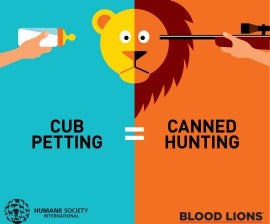
Social media is flooded with heart-warming images of visitors cuddling lion cubs and “rescued” lions walking peacefully alongside visitors and volunteers. However, the interaction with these animals is falsely portrayed. The cuddled and petted cubs and older lions are anything but safe, loved and rescued from an otherwise doomed life.
The truth is, South Africa has a dark secret. At least 7,800 lions are suffering in captivity — legally.
Breeders tear the lion cubs away from their mothers at just a few days old, only to offer them as living photo props and fake “orphans” for paying volunteers to hand-raise, and tame them for a life of exploitation. In the wild, cubs remain with their mothers for approximately 18 months before becoming fully independent and females typically rest for over 6 months (± 7-72 months on South African managed reserves) between births. The removal of days-old cubs forces the females into a stressful life of exhausting and endless breeding. Also, the conditions in which the captive-bred lions live are shocking; these wild cats are confined to tiny enclosures, sometimes without adequate food, hygiene and the ability to express natural behaviors.
When the tame cubs are a few months old, their “job description” changes. Many facilities offer “walk with” lion activities to unsuspecting tourists, but they never reveal that when these lions are older, they will be killed for the bone trade (bones being commonly exported to Asia for use in unproven traditional medicines) or sold to be killed by trophy hunters in “canned or captive-bred” lion hunts (the practice of shooting hand-reared, captive-bred lions in a fenced area from which they cannot escape).
Lions bred in captivity cannot be released back into the wild. The African Lion Working Group, with a membership of over 100 leading lion scientists and researchers, states clearly that “Captive breeding of lions for sport hunting, hunting of captive-bred lion and the associated cub petting industry are not conservation tools. In our opinion, they are businesses…”
In 2020, as part of engagements with the South African government on wildlife management, three open letters from scientists, NGOs and the tourism sector were sent to Minister Creecy, urging her to bring an end to South Africa’s captive lion breeding industry. These engagements contributed to the adoption of recommendations put forward by the Department of Forestry, Fisheries and the Environment on matters of elephant lion, leopard and rhinoceros management, breeding, hunting, trade and handling, including the recommendation that the “Minister puts in place a process to halt and reverse the domestication of our iconic lions, through captive lion keeping, breeding, and commercial use, putting in place ethical and humane procedures for euthanasia of existing captive lions”. The authors determined that “the captive lion breeding industry did not contribute to conservation and was doing damage to South Africa’s conservation and tourism reputation.”
Humane Society International collaborated with the teams behind the award-winning films “Blood Lions“® and “Lions, Bones & Bullets” to end this cruel cycle of exploitation and to hold the South African government to its commitment to end the captive lion breeding industry. Offering these activities damages South Africa’s tourism brand and conservation efforts.
We are calling on tour operators to sign the “Born to Live Wild” pledge, committing to this statement:
- Lions and other predators are wild species, and we wish to continue promoting Africa as an authentic, wild and rewarding tourism destination, and
- We wish to continue our support and promotion of the formal conservation community in their endeavors to secure the survival of Africa’s predators in the wild.
More than 100 tour operators have already signed this pledge: http://www.bloodlions.org/born-to-live-wild/
Learn more
Watch for free: “Blood Lions”®—an award-winning documentary feature film that exposes the misleading claims made by the lion breeding and canned hunting industries in South Africa. https://vimeo.com/157818314
See Humane Society International/Africa Wildlife Director Audrey Delsink—in partnership with the team behind “Blood Lions”®—streaming live from Makalali Private Game and sharing a message that humane tourism is about witnessing these majestic big cats in the wild, not paying to pet them or walk with them.
Watch for free: “Lions, Bones & Bullets”—an award-winning investigative documentary that uncovers elaborate, international wildlife fraud worth nearly $100 million annually in South Africa’s controversial commercial captive lion industry and follows the wildlife trafficking trail to Laos and Viet Nam. https://www.waterbear.com/watch/lions-bones-bullets
